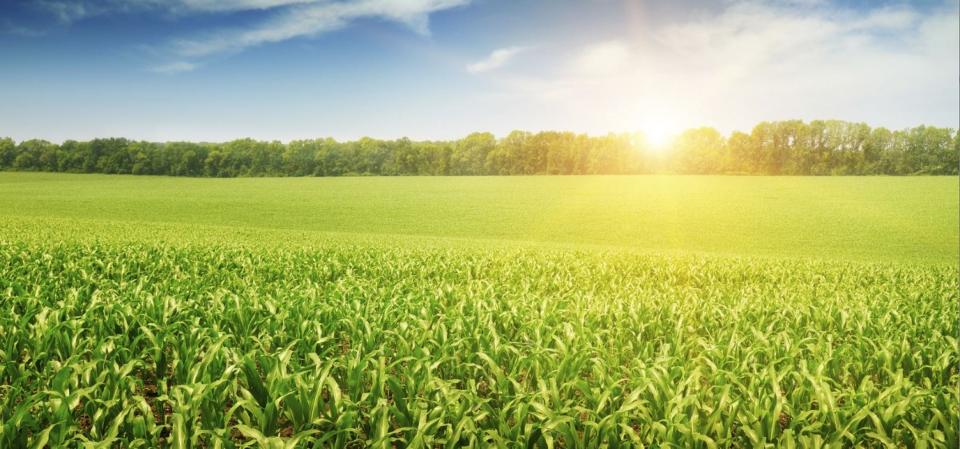3 Things You Should Know About Herbicides
This post was originally published on Forbes on September 2, 2016.
Post written by Kate Hall. Kate Hall is managing director of the Council for Biotechnology Information and GMO Answers spokesperson.

Without herbicides and other weed management tools, crop yields for corn and soybean fields would drop significantly, resulting in billions of dollars in annual economic losses. (Image Credit: GMO Answers)
At GMO Answers, we get a lot of questions about herbicides. Many people wonder whether herbicides are really necessary and if glyphosate in particular, a broad-spectrum herbicide, is really safe. Consumers are exposed to a lot of conflicting information about herbicides, so to get to the bottom of both questions, it’s important to take a closer look at the science and consider the ways that herbicides are actually used in day-to-day agricultural production.
1. Without herbicides, crop yields would plummet
Some people think that we would be better off if herbicides were left out of agricultural practices, but they may be surprised to learn that weeds are actually one of the most significant threats to crop production in North America. The reality is that without herbicides and other weed management activities, uncontrolled weeds would cause enormous reductions in crop yield and quality and lead to billions in lost revenue.
Research conducted by the Weed Science Society of America (WSSA) showed that if weeds were left to grow unchecked in corn and soybean fields in the United States and Canada, crop yields would drop by about 50%, resulting in $43 billion annual economic losses.
The research, led by Kansas State University weed ecology scientist Anita Dille, spanned seven years from 2007 to 2013 and reveled the scope of a threat to agricultural production that many take for granted. The results showed that on average, weeds cause 49.5% soybean yield loss and 52% corn yield loss when using best management practices but no herbicidal weed control.
The WSSA researchers are planning to release similar reports assessing the potential impact of weeds on the production and yield of a variety of other crops, including winter and spring wheats, grain sorghum, vegetable crops, rice and cotton. More recently, an exhaustive study by the National Academies of Sciences, Engineering and Medicine showed that evidence accumulated over the last two decades indicates “that herbicide-resistant crops contribute to greater yield where weed control is improved because of the specific herbicides that can be used in conjunction with the herbicide-resistant crop.”
2. Are GM crops “doused” in herbicides? No.
Several GM crops have been developed specifically for herbicide tolerance, which allows farmers to make fewer pesticide applications on GM crops. Brian Scott, a northwest Indiana farmer who farms just over 2,200 acres of corn, soybeans, popcorn and wheat puts herbicide use in perspective in this video:
3. Herbicides go through rigorous testing
Given the important role that herbicides play in crop yield and our food security, it should come as no surprise that herbicides are subject to rigorous health and safety testing. The use of every herbicide on food crops in the United States is evaluated by the U.S. Environmental Protection Agency (EPA) against a standard of reasonable certainty that the use would cause no harm to human health and the environment. There is an acceptable daily intake (ADI) set for every herbicide, and as Dr. David Saltmiras, science fellow at toxicology manager at Monsanto Company, explains, “Just to be on the safe side, the EPA sets the acceptable daily intake (ADI) a minimum of 100 times lower than any dose level that showed any kind of toxicity in any study conducted.”
Glyphosate is no exception. Many regulatory agencies and scientific institutions worldwide have evaluated the safety of glyphosate as an herbicide and concluded that there is no indication of any human health concern.
Nevertheless, consumers periodically raise questions about whether or not glyphosate is safe, in part because while many people are familiar with or have used products like Roundup in their gardens or lawns at home, they don’t understand herbicide use in agricultural production.
To help clear up misconceptions, we asked sixth-generation Florida farmer and rancher Lawson Mozley to weigh in and explain how glyphosate is used on his farm. Mozley uses a formulation of Roundup to eradicate weeds from his fields where Roundup Ready corn, soybeans and cotton, as well as conventional corn, soybeans, cotton, peanuts, oats and grasses, are grown.
Like all agrichemicals, products containing glyphosate are regulated by the EPA and must be stored and applied according to EPA regulations. These regulations include maximum application rates, which tell the applicator how much of a chemical can be used and during what stages of plant growth. Some consumers may be interested to learn that glyphosate is not applied when ears of corn or other harvestable foods are present on the crop. When used on conventional crops that are not glyphosate-resistant, glyphosate is not directly applied to the crop. When used on GM glyphosate-resistant crops, glyphosate can be applied to the crop but only at certain stages of growth.
Mozely says that at his farm, about 90% of the time, they apply much less than the maximum rate both with conventional and Roundup Ready crops. Mozely believes that “just like any other tool, glyphosate has its intended uses,” and as a farmer, he thinks it’s important to keep an open mind when it comes to innovative agricultural tools, including agrichemicals, which can help improve the livelihood of crops.
While “chemicals” has become a something of a dirty word, the reality is that they’re an integral part of modern agricultural production and are used in various food production methods around the world, including organic farming. Without the use of herbicides and other important crop protection products throughout agriculture, not only would our economy suffer billions in lost dollars, many more people would suffer from hunger as far less food would it make it from the farm to our tables.